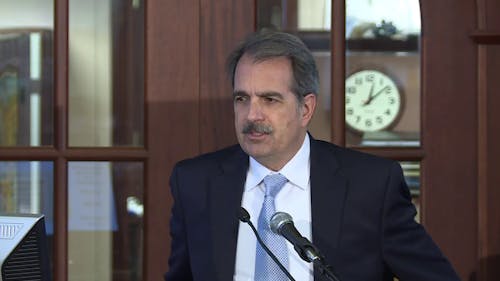Rutgers professor reviews recently translated Hebrew Bible

In his review of the recently completed translation of the Hebrew Bible, a Rutgers professor provides insight into the literary nature of the task.
Robert Alter, a professor at the University of California-Berkeley, first began translating the Hebrew Bible in 1997, according to the Jewish Telegraphic Agency. More than two decades later, he finally finished the undertaking in November of last year.
“It was a surprise to see how he has been doing this, but on the other hand remarkable that he was able to accomplish this,” said Gary Rendsburg, a professor in the Department of Jewish Studies.
In his review of the translation, titled “A Man, a Book, a Mission," Rendsburg detailed the complexity regarding the grammar and syntax that had to be chosen for the translation. Other translations had existed, but Alter’s translation sought to reduce some of the issues that the other ones had.
"Most translations of the Hebrew Bible did not capture the depth of the Hebrew language and its translation," Rendsburg said.
When a text is translated, there is a source, which in this case is Hebrew, and the target language, which would be English. Most translators try to make the translation fluid in the target language, but Alter’s translation provided a balance between the fluidness of English and the principles of Hebrew.
“What he did was balance what still reads as English but captures some of the essences of Hebrew in a beautiful way,” Rendsburg said.
For instance, Alter placed the object of the translated sentence before the verb, which is not conventional in English. In Hebrew, this is done to place emphasis on the object of the sentence.
“If I say 'John hit the ball,' we say 'John hit the ball,'” he said. “But if you wanted to emphasize something, in the object you can put that first syntactically and you can say 'the ball John hit,' which shows you that there’s not a lot of focus on John so much, but on the ball, and (Altar) captured that in English.”
Other than sentence structure, Alter’s translation also captured the rhythm of Hebrew with his choice of words, Rendsburg said. For example, although the word for "soul" does not exist in Hebrew, Altar was able to capture its concept without using the English word in the translation.
The translation was also remarkable because it was done entirely by one person, Rendsburg said. Translations are typically made with a “party” or committee, but there were benefits to a religious text being translated by an individual.
“It’s remarkable he did this, chapter by chapter, and a great testimony to what one scholar can do,” he said. “Most translations are done by committee. Some people get to do one book and some people get to do another, and this creates some inconsistency and if you translate it one way and your peer does it another. Having a single person over the entire translation allows that kind of consistency.”
Furthermore, Alter not only wrote the translation, but also included many notes in the 3,000-page volume set, Rendsburg said.
Very few approached the Hebrew Bible for what it was: literature. Alter was leading the shift, and while philosophy, archaeology and history were good instruments to study the Hebrew Bible, they also had their limitations. When people started seeing these limitations, looking through a literary perspective allowed for a more extended understanding.
“His guidance is a beautiful work, his translation is a major accomplishment and his notes are beautifully written and succinct. They guide the reader on how the text operates in literature,” Rendsburg said.
// Editor's Note: A previous version of this article incorrectly referred to the translator of the Hebrew Bible as Robert Altar, not Robert Alter. This article has been updated with corrections.



